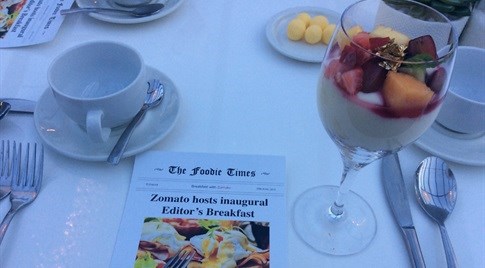Silky yoghurt and muesli with just the right dash of crisp, zingy hollandaise sauce and sharp foodie talk - all this and more formed the basis of the first ever Zomato Editors' breakfast worldwide, held this past Tuesday, 9 June at the Glass Lounge at the Cape Milner Hotel...
Just a few weeks ago, most South Africans hadn't heard of Zomato - they thought you were mispronouncing the name of a misleading fruit (tomato) or severely mangling that of one of the best used vegetables (potato). Leap forward to today, and there's hardly a foodie in the land who hasn't at least signed up for a personal Zomato profile, through which to rate local restaurants and post their personal reviews, or to at least scroll through the easy-to-navigate, localised search criteria, which is narrowed down to all restaurants in your area, which are currently open, serving your current cuisine craving, even including a handy map for you to pinpoint your next meal, fast.
In fact, so fast has been the uptake that there are already close-on 10,000 restaurants listed in the two-year old South African version of this app that was a New Delhi start-up just seven years ago, covering everything from fast food to vineyards, because you never know when your next hunkering for a leg of spicy peri-peri chicken or a quick glass of fizz will strike. But how exactly does it work?
Fastest finger first...

The delightful table setting
Lesego Puso, the Zomato SA PR and community manager, explains that the team goes out and physically collect all the menus listed on the app themselves - these are scanned in and users can comment if they feel the quality isn't readable. The rest is up to the consumers to list their experiences - the only criteria is that you must have physically been to the restaurant at some point. All reviews are published, expect where there is an obvious attempt to blacklist or abuse a specific employee. Given South African's rather well-known culture of complaining, it's surprising that there aren't many complaints, instead the bulk of reviews on the app are overwhelmingly positive, listing specific elements of dishes and wait staff's knowledge of wine-pairing.
Then, the more people rate a specific food outlet, the more popular it is in the app and the more likely to show up in different food 'collections' - of course we asked what food type had proven most searched for locally, with Puso confirming that the most local search interaction over the two months on the app was on where to eat chilli poppers (my favourite, I confess I was at least 1 of those search stats). As to the rest of the digits, there are roughly 450,000 uniques per month in Cape Town.
That's no small fry, but not surprising when you take in that Zomato has come to be known as the Facebook of food and is a bit of a celebrity in New Delhi, where it originated. The reason is clear: People used to turn to cookbooks and Mr Delivery brochures to find out what and where to eat, but the rise of social media means today people trust their friends more than they do experts.
Changing the definition of a 'foodie'
Having spent the past two years since the Zomato South Africa launch on a business-to-business mindset, a PR and marketing department has been added to the mix, and the results are clear. The new team is enthusiastic and clearly loves food - crucial as they're looking to change the definition of 'foodie' from a food snob to a person who seeks out good food experiences rather than simply eating out of convenience or hunger. So popular has this proven that there are now regular #zomatomeetups, where bloggers and foodies eat a meal together and share the experience, reviewing it afterwards in a completely unbiased way - if you hate it, say so - the whole point is honesty and to give others an idea of what the experience was like for you."
Go on, give it a whirl - I guarantee you'll be hooked, dishing up your own likes and drinking in the comments. It's addictive!
For more on Zomato, follow their Twitter account and click here to visit the website and download the app.

































